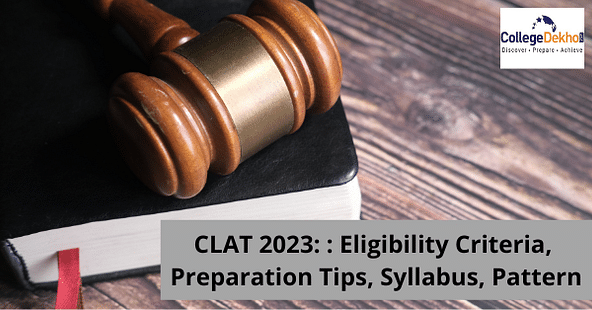The CLAT 2023 results have been released by the conducting body. Here is all you need to know about CLAT 2023 detailed admission process.
- CLAT Notification 2023
- CLAT 2023 Important Dates
- CLAT 2023 Highlights
- CLAT 2023 Eligibility Criteria
- CLAT 2023 Registration Process
- CLAT Registration Fees 2023
- CLAT 2023 Exam Pattern
- CLAT 2023 Syllabus
- Preparation Guide for CLAT 2023
- CLAT 2023 Admit Card
- CLAT 2023 Result
- Top Colleges for Direct Admission without CLAT
- Faqs

The Consortium of National Law Universities had declared the exam date for CLAT 2023 and it was held on December 18, 2022. The CLAT 2023 Cutoff will be out soon as CLAT 2023 results are out which can be checked here- CLAT 2023 Results (Released) . Candidates can also check the CLAT 2023 Toppers List here.
CLAT is an entrance examination for ca ndidates seeking admission to undergraduate and postgraduate law programmes such as the five-year integrated BA LL.B, B.Sc LL.B, BBA LL.B, B.Com LL.B, and LL.M law degrees offered at 22 NLUs. CLAT will be a comprehension-based paper in which an individual's legal aptitude, skills, and knowledge will be tested.
CLAT Notification 2023
CLAT notification 2023 was published by the Consortium of NLUs, who administer the CLAT national-level law examination annually. CLAT scores are also accepted by leading universities such as the Institute of Law at Nirma University Ahmedabad, NMIMS-Mumbai, UPES Dehradun, and the Institute of Law at Nirma University. Aspirants must go through the entire article to learn about the CLAT exam 2023.
CLAT 2023 Important Dates
Given below are the important dates for CLAT 2023 -
Events | Dates |
|---|---|
Start of CLAT 2023 Online Application Submission | August 8, 2022 |
Last Date for CLAT 2023 Application Form Submission | November 13, 2022 |
CLAT 2023 Admit Card Release Date | November 2022 |
CLAT 2023 Exam Date | December 18, 2022 |
CLAT 2023 Result Date | December 23, 2022 |
CLAT 2023 Merit List Declaration Date | To be notified |
CLAT 2023 Admission and Counselling Registration Date | To be notified |
Release of CLAT 2023 First Seat Allotment List | To be notified |
Release of CLAT 2023 Second Seat Allotment List | To be notified |
Release of CLAT 2023 Third Seat Allotment List | To be notified |
Release of CLAT 2023 Fourth Seat Allotment List | To be notified |
Release of CLAT 2023 Fifth Seat Allotment List | To be notified |
CLAT 2023 Highlights
Check out the highlights of CLAT 2023 below:
Exam Name | CLAT |
|---|---|
Full Name | Common Law Admission Test |
Exam Frequency | Once a year |
Registration Form | Online |
Registration Fee | General/ SAP/ OBC or Others: Rs. 4,000 |
SC/ ST: Rs. 3,500 | |
Exam Mode | Pen-Paper Mode |
Exam Duration | 2 hours |
Total Applicants | 59,000 (approx.) |
Exam Accepting Colleges | |
Courses Offered | |
Total Number of Seats | Integrated LLB: 2538 seats |
LLM: 742 seats | |
Contact Details | Phone: 08047162020 Email: clat@consortiumofnlus.ac.in Time: 10:00 AM to 05:00 PM (on working days) |
CLAT 2023 Eligibility Criteria
Here are the detailed eligibility criteria of CLAT 2023 for UG and PG law courses:
CLAT 2023 UG Eligibility
The Consortium of NLUs (National Law Universities) defines the CLAT 2023 eligibility criteria for both integrated LLB and Master of Law - LLM programmes.
Before completing the CLAT online application form, aspirants should review the eligibility requirements listed here -
- Applicants for the UG Programme through the CLAT 2023 have no upper age limit.
- Aspirants from the General/OBC/PWD/NRI/PIO/OCI categories must obtain forty-five percent - 45% or an equal grade in their qualifying examination (i.e., 10+2 or an equivalent examination).
- Applicants from the SC/ST categories must have received 40% or higher in their 10+2 examination.
- Candidates who are scheduled to take their qualifying examination in March/April 2023 are also eligible to take the CLAT 2023 exam. They will, however, be required to provide confirmation of passing the qualifying examination at the time of admission, or they will lose their right to be considered for admission.
- The candidates must submit the qualifying examination result (i.e., 10+2) at the time of admission; otherwise, they will be disqualified for admission to the course for which they have applied.
CLAT 2023 PG Eligibility
Here are the eligibility conditions for the CLAT 2023 PG exam -
- A Bachelor of Law - LLB degree or an equivalent examination is required to apply for CLAT 2023 PG.
- Students must have achieved a minimum of Fifty percent (50%) marks or its equivalent grade for candidates from the General/OBC/PWD/NRI/PIO/OCI categories and Forty-five percent (45%) marks or its equivalent grade for candidates from the SC/ST categories.
- Contenders who will be taking their qualifying exam in April/May 2023 are also eligible to apply.
- There is no maximum age restriction for taking the CLAT 2023.
CLAT 2023 Registration Process
Here are important steps to filling CLAT 2023 application form:
Step 1: Visit the official website of CLAT, i.e. consortiumofnlus.ac.in, and register yourself for the exam.
Step 2: Log in using the registered details and enter all the valid details.
Step 3: Upload all the required documents and submit the application form by paying the registration fee.
To find out the rest of the important details about CLAT 2023 Registration click on the link given below:
Also Read: How to Prepare for CLAT Without Coaching
CLAT Registration Fees 2023
Candidates taking the CLAT in 2023 need to be aware of the cost to register for the exam. Please use the table below for a quick summary of the CLAT 2023 application fee structure.
Category of Candidates | Application Fees |
|---|---|
General/OBC/SAP or Others | Rs 4000/- |
SC / ST | Rs. 3500/- |
CLAT 2023 Exam Pattern
Check out a glimpse of the CLAT 2023 Exam Pattern below -
Exam Language | English |
|---|---|
Question Type | UG: MCQs |
PG: MCQs & Subjective | |
Total Number of Questions | UG: 150 questions |
PG: 120 questions | |
Negative Marking | Yes |
Marks per Correct Answer | +1 |
Marks per Incorrect Answer | -0.25 |
Marks per Unattempted Question | 0 |
In order to succeed on the CLAT 2023 exam, students need to have a thorough understanding of the exam's format and content. Getting a feel for the CLAT exam pattern is crucial in order to evaluate the test's format.
The CLAT 2023 examination outline includes details such as the total number of questions, total marks, time duration, marking scheme, sectional question distribution, exam timing, etc. Better preparation for CLAT 2023 will be possible with an understanding of the exam pattern.
Clarity will result from a thorough reading of the fundamentals of law in addition to the aptitude section, which includes reasoning as well as the quantitative and legal aptitude sections of CLAT 2023. The CLAT Exam 2023 will assess applicants' aptitude as well as their reasoning and comprehension abilities.
The CLAT 2023 Question Paper for the UG section will not assess prior legal knowledge but the analytical/logical skills required for legal education. Future applicants must review CLAT Analysis 2023 following the exam to understand the exam degree of difficulty and projected cut-off.
Exam Pattern for CLAT UG 2023
The UG-CLAT 2023 will evaluate candidates' comprehension and reasoning abilities. The new CLAT UG 2023 exam pattern is listed below -
- Overall, it is planned to be a test of aptitude and skills necessary to study law rather than pre-hand knowledge.
- Knowing law subjects in advance may be useful in answering questions in the Current Affairs section on occasion.
- The UG-CLAT 2023 exam will last two hours and will consist of 150 multiple-choice questions worth one point each.
- 0.25 points will be subtracted for each incorrect answer.
Take a look at the table below to get an idea of how many questions will be asked in each of the exam sections of the CLAT Exam 2023 for the undergraduate program -
Subjects | Number of Questions |
|---|---|
English Language | 28-32 questions |
Current Affairs, including General Knowledge | 35-39 questions |
Logical Reasoning | 28-32 questions |
Legal Reasoning | 35-39 questions |
Quantitative Techniques | 13-17 questions |
Exam Pattern for CLAT PG 2023
The PG-CLAT 2023 will place a high priority on students' comprehension skills. It will last 120 minutes and will have one section.
Here is the pattern of the CLAT 2023 for the PG programme -
- Students will have to answer 120 objective-type questions, each worth one point in the first segment.
- Every incorrect answer will cost you 0.25 marks.
- Constitutional Law, Property Law, Company Law, Public International Law, Jurisprudence, Administrative Law, Contract Law, Torts, Family Law, Criminal Law, Tax Law, Environmental Law, and Labour & Industrial Law will be covered in the paper.
- In the Objective segment of the PG-CLAT 2023, students will be given extracts from primary legal resources and materials, such as important court decisions in various fields of law, statutes, or regulations.
- The exam has a total of 120 marks.
The following sections are part of the CLAT 2023 PG -
- Constitutional Law
- Other Subjects of Law such as Criminal Law, Contract, Torts, International Law, IPR & Jurisprudence
CLAT 2023 Syllabus
CLAT 2023 will have questions based on subjects like the English Language, Legal Reasoning, Current Affairs, including General Knowledge, Logical Reasoning and Quantitative Techniques. Candidates can go through the important details and detailed CLAT 2023 Syllabus to score well in the exam.
CLAT UG 2023 Syllabus
For thorough preparation, aspirants must review the detailed CLAT 2023 Syllabus and all the sections to be covered. CLAT Exam 2023 is divided into five sections, which are detailed below.
English Language of CLAT 2023
Students will be given passages of approximately 450 words each in this section of the UG-CLAT 2023.
These passages will be drawn from contemporary or historically significant fiction and non-fiction writing and will be of a standard that a 12th grade student could read in about 5-7 minutes.
Each passage will have a series of questions designed to test the candidate's comprehension and language skills, including their capability to:
- Read and comprehend the main point discussed in the passage, as well as any arguments or points mentioned or set out in the passage;
- Based on the passage, make inferences and draw conclusions.
- Summarise the provided content.
- Scan through and determine the passage's various arguments or points of view.
- Recognize the meaning of the passage's various words and phrases.
Current Affairs and General Knowledge of CLAT 2023
Students will be given passages of up to 450 words in this section. The passages will be drawn from news reports, journalistic publications, and other non-fiction materials.
The queries may require the candidates to attempt an examination of legal information or knowledge discussed in or related to the passage, but no additional legal knowledge beyond the passage is considered necessary.
Each passage will be followed by a series of questions requiring them to demonstrate their understanding of various elements of current affairs and general knowledge, such as:
- Contemporary events of significance from India and the world;
- Arts and culture;
- International affairs; and
- Historical events of continuing significance.
Quantitative Techniques of CLAT 2023
Short fact based or propositional sets, graphs, or other textual, pictorial, or diagrammatic representations of numerical information will be followed by a series of questions in the UG-CLAT 2023's Quantitative Techniques section.
Applicants will need to be able to extract information from texts, graphs, and other visual displays and perform mathematical operations on that data. Applicants' ability to interpret and apply numerical data will be evaluated across 15–17 questions spread across 5–6 passages in the CLAT 2023 Quantitative Reasoning section.
The majority of questions here are based on quantitative data, such as percentages, ratios, averages, profit and loss, time and effort.
Answering the questions will require the students to:
- Infer, draw conclusions, and adjust numerical data presented in such text, graphs, and visual displays; and
- Use the full range of 10th grade mathematical abilities to analyse this data, from ratio and proportion to basic algebra, measurement, and estimation.
- All questions will be relatively simple, up to the 10th-grade level, so students won't need to worry about the more advanced mathematics covered in the 11th and 12th grades.
Logical Reasoning of CLAT 2023
This section of the CLAT Exam 2023 will evaluate the fundamentals of the applicants' logical reasoning knowledge by assigning 9-10 passages totaling 29-30 questions. This section takes some practice and effort, and applicants should familiarise themselves with the questions asked in order to answer them in less time.
The UG-CLAT 2023 Logical Reasoning section will consist of a series of short passages of about 300 words each. Each passage will be followed by one or more questions in which the applicant will be required to -
- Recognize an argument, its premises, and conclusions.
- Read the passage and identify the arguments presented.
- Analyse patterns of reasoning critically and ascertain how conclusions may be influenced by specific premises or evidence.
- Determine what follows from the passage and apply the findings to new situations.
- Draw analogies and relationships, recognise inconsistencies and equivalence, and assess the viability of arguments.
Analytical Reasoning
The maximum number of questions in this section is determined by the topics such as questions on Puzzles, Circular Arrangements, Syllogism, and Inequality. With guidance and practice, aspirants can master the art of answering logical reasoning questions that follow a specific pattern.
Legal Reasoning of CLAT 2023
To attempt this section successfully, one must excel at reading and comprehension. Knowledge of fundamental legal principles enshrined in the constitution can greatly improve an applicant's chances of scoring well in the CLAT 2023.
An applicant's legal knowledge aids him or her in understanding the context of the questions, as CLAT now focuses on comprehension and drawing actual relevance along with conclusions from a given passage/circumstance.
Applicants will be instructed to read passages of approximately 450 words each in this section. The passages may be about actual events or scenarios involving legal issues, public policy issues, or moral philosophical inquiries. Students will not need any prior legal knowledge.
They will benefit from a broad understanding of current legal and moral issues in order to better apply general principles or propositions to the given fact scenarios.
Each passage would be accompanied by a series of questions requiring students to -
- Identify and infer the rules and principles outlined in the passage;
- Apply these rules and principles to a variety of factual situations; and
- Understand how rule changes or principles may affect how they are applied in different fact situations.
CLAT PG 2023 Syllabus
The PG-CLAT 2023 will place a strong emphasis on students' comprehension abilities. The paper will be centred on the undergraduate program's mandatory subjects, among which are Constitutional Law, Jurisprudence, Environmental Law, Public International Law, Property Law, Administrative Law, Contract Law, Torts, Family Law, Criminal Law, Company Law, Tax Law, and Labour & Industrial Law.
Objective Section
Exam-takers will find extracts from primary legal materials such as significant court decisions in numerous fields of law, enactment, or regulations in this section of the PG-CLAT 2023. Each exam passage will be followed by a series of questions requiring students to demonstrate the following:
- Capacity to comprehend and read the passage's issues, as well as any arguments or viewpoints mentioned or set forth in the passage
- Recognizing of the issues discussed in the passage, as well as legal issues and facts related to and originating from the passage and the judgement or statute from which it is derived
- sum up the passage
- Competency to apply their knowledge of the legal fields covered in the text
Also Read:
Preparation Guide for CLAT 2023
For applicants, here are some specialist CLAT Preparation 2023 tips. To improve the speed and accuracy, aspirants must do section-by-section revision and solve sample questions numerous times.
- When studying for a competitive exam, one of the most important things an applicant can do is review previously read material in order to cement the material into long-term memory.
- The aspirants must go over the material again to make sure they understand the concepts. Get familiar with the CLAT 2023 Quiz to reinforce their knowledge of all the material.
- They must start with the fundamentals and work their way up to the more advanced material for the CLAT Exam 2023.
- Mentors can help applicants identify areas of weakness early on so that they can devote more time to those sections.
- Taking the CLAT 2023 Practice Test on a regular basis will force the students to study and prepare consistently.
- The applicant's ability to gauge their own performance is improved by a good peer group, and the competitive atmosphere is boosted as a result. As a result students can enrol in coaching classes, if they find preparation at home by themselves is challenging
- The CLAT 2023 Online Classes are another resource available to students preparing for the upcoming exam.
- They must never underestimate the value of asking questions to their mentors and teachers.
- Applicants can thus often receive helpful feedback from their peers and mentors.
- If students want to crack the CLAT 2023 at one go, they should devote enough time to preparation and manage their entrance studies along with regular education.
Special Preparation Tips for the UG-CLAT 2023
The Consortium intends to publish a variety of preparatory materials for the UG-CLAT 2023, including CLAT question paper guides and sample questions.
- Instructional resource materials and exercises for each of the subjects covered by the UG-CLAT 2023.
- Candidates who have successfully completed their application to the UG-CLAT 2023 will also be given access to a learning platform where they will be able to access the preparatory materials described above, as well as their scores on various exercises and model question papers.
- Furthermore, students should improve their ability to read and comprehend considerable amounts of text. They should remain updated on news and current events by reading quality newspapers and periodicals on a regular basis.
- They must improve their speed of answering questions on quantitative techniques by practising with materials such as 10th grade mathematics textbooks.
Special Preparation Tips for the PG-CLAT 2023
Studying for the PG-CLAT 2023 will involve:
- Students must read and refresh their knowledge of important judgments and attempt to discern various issues discussed in such judgments.
- They should review the relevant constitutional and legislative provisions, paying special attention to those that have been discussed in recent judicial decisions.
- They should also make sure that they are familiar with the relevant case law and amendments from the past, for a fuller understanding of the relevant provisions and the issues surrounding them.
Provided below is the preparation guide for CLAT 2023 exam:
Also Read: CLAT Dos and Don'ts
CLAT 2023 Admit Card
CLAT 2023 admit card will be available in November 2022. Applicants must bring their admit card to the exam centre on the day of the exam. To obtain the CLAT 2023 admit card, candidates must first log into their portal and enter their Username and Password.
They can print the admit card after downloading the PDF file. The candidate's name, date of birth, reporting time, and exam centre address are all listed on the CLAT admit card.
Before taking a printout of the CLAT 2023 admit card, aspirants must authenticate all of the details on the admit card and report any differences to the appropriate authority. The admit card is also used during NLU counselling and seat allocation.
Here are all the relevant details about the CLAT 2023 admit card.
CLAT 2023 Result
The results for the CLAT 2023 are released on 23 December 2022. A candidate's CLAT score can be viewed online after logging in with their username and password. Each section's score, as well as the candidate's overall score and marks, will be listed on their CLAT 2023 result cum scorecard. Aside from the overall CLAT merit list, individual NLU lists will also be made available.
Details such as candidate’s name, application number, category, roll number, CLAT category rank, CLAT all India rank, total CLAT score, etc. will be displayed in the CLAT result 2023.
CLAT 2023 Counselling
Counselling is held for all candidates who passed the CLAT 2022 exam and are on the invite list. Online registration, selection, document submission and verification, and seat assignment are all part of the counselling process. Following seat allocation, candidates must complete the admissions process and pay the course fee at the designated national law university.
It is being held online. Applicants who pass the CLAT examination are admitted to integrated BA LLB and Master of Law - LLM programmes. Admission to law programmes will be handled through centralised counselling, which will occur in five rounds.
CLAT seat allocation will be based on category, rank, and the number of available seats. The merit list is released just a few days after the written test results. Applicants who appear on the CLAT merit list are invited to CLAT 2023 counselling.
All aspirants are required to participate in the CLAT 2023 counselling process. Candidates will be admitted only after they have paid the application fee and had their documents verified.
Top Colleges for Direct Admission without CLAT
Most candidates are unable to join NLUs due to the fierce competition and limited seat availability. However, a low CLAT score does not rule out the possibility of pursuing law education. Check out the colleges identified below that accept applicants without a CLAT score. Aspirants can apply for admission to the desired law colleges by clicking on the links provided below.
Law College | Location |
|---|---|
Bhopal, Madhya Pradesh | |
Chandigarh, Punjab | |
Phagwara, Punjab | |
Jaipur, Rajasthan | |
Mathura, Uttar Pradesh | |
Sonepat, Haryana | |
Bareilly, Uttar Pradesh | |
Hyderabad, Telangana | |
Bhubaneswar, Odisha | |
Neemrana, Rajasthan | |
Bangalore, Karnataka | |
Mehsana, Gujarat | |
Dehradun, Uttrakhand | |
Raipur, Chhattisgarh |
Related Links:
Candidates having any questions or concerns, can call our toll-free student helpline at 1800-572-9877. Our admission specialists and exam experts are available to help.
Students can also fill out the Common Application (CAF) and send applications to multiple institutions at one go. For more details on law school admissions in India, keep checking back with CollegeDekho . For any concerns related to admission and courses, please feel free to connect with us through the Q&A section .
















Similar Articles
What is a Good Score in AILET 2025?
AILET 2025 Expected Cutoff for All Categories
What is the Required CLAT 2025 Rank for GNLU Silvassa Admission?
What is the Required CLAT 2025 Rank for MNLU Nagpur Admission?
List of NLUs for Admission with CLAT 2025 Rank between 1000 - 2000
List of NLUs for Rank between 1-1000 in CLAT 2025